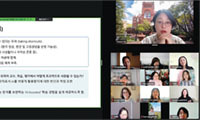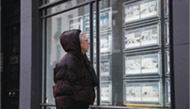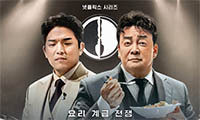For Korean Chefs, Tacos Come With Kimchi

Korean-Americans in Los Angeles are taking their food beyond their neighborhoods. Devoted fans of Kogi Korean BBQ-To-Go, above, which fuses Mexican and Korean traditions, wait for more than an hour.
By JENNIFER STEINHAUER
LOS ANGELES - As the sun begins to sink behind the Santa Monica Mountains and the northbound traffic thickens on the nearby freeway, the hungry refresh their browsers.
After obsessively checking the Korean taco maker’s postings on Twitter, the social networking site, to see where the truck will park next, the throngs begin lining up.
And they wait, sometimes well beyond an hour, all for the pleasure of spicy bites of pork, chicken or tofu soaked in red chili flake vinaigrette, short ribs doused in sesame-chili salsa roja or perhaps a blood sausage sauteed with kimchi, all of it wrapped in a soft taco shell.
The food at Kogi Korean BBQ-To-Go, the taco vendor that has overtaken Los Angeles, does not fit into any known culinary category. One man overheard on his cellphone as he waited in line on a recent night said it best:“It’s like this Korean Mexican fusion thing of crazy deliciousness.
The truck is a cult hit in Los Angeles, drawing more buzz than any new restaurant. A sister vehicle and a taco stand within a Culver City bar were recently added to quell the crowds, which Kogi’s owner put at about 400 customers a night.
Kogi, the brainchild of two chefs, has sprung up at just the right moment. Its tacos and burritos are recessionfriendly at $2 each. The truck capitalizes on emerging technology by sending out Twitter alerts so fans know where to find it at any given time.
Yet Kogi’s popularity and the sophistication of its street food also demonstrate the emerging influence of this city’s Korean food purveyors.
In the last few years, second-generation Korean Angelenos and more recent immigrants have played their own variations on their traditional cuisine and taken it far outside of Korean-dominated neighborhoods.
“We thought Korean food was underrepresented here, and we were right, said Robert Benson, the executive chef of Gyenari in Culver City, who has two Korean partners.“There is a certain mysticism to Korean food, and we have tried to make it more accessible.
At the same time, an increasing number of Korean chefs and restaurateurs here have aligned themselves with other nations’ cuisines, to great acclaim.
One of the city’s hottest hamburger spots, Father’s Office, is owned by Sang Yoon, 39, who immigrated to Los Angeles from Korea when he was a year old. He cooked at Michael’s, a well-known restaurant in nearby Santa Monica, before taking over an old bar nearby, now packed with people willing enough to wait in line for an Office Burger. It is served with Mr. Yoon’s choice of accompaniments (caramelized onions, blue cheese, Gruyere, arugula), not theirs. A second Father’s Office recently opened in Los Angeles.
Scoops, an artisanal ice cream store in East Hollywood that whips up strawberry balsamic vinegar and brown bread treats, is run by Tai Kim, who came with his family to California from Korea as a teenager. Korean-Americans have made their mark in the frozen- yogurt trade, too, with Pinkberry and Red Mango.
“The first generation of Korean immigrants here mainly catered toward a Korean clientele, or made grocery markets catering to a minority clientele, said Edward Chang, a professor of ethnic studies at the University of California, Riverside.“But more recent immigrants have ethnic and capital resources that enable them to branch out in the mainstream economy.
Thus,“Korean-Americans have gained visibility since the unrest of 1992, when riots targeted Koreanowned businesses, he said,“and over the last 10 to 15 years, they became much more visible. In terms of economic and political spheres, they are forces to be reckoned with.
Roy Choi, 38, who runs the Korean taco truck, calls himself“the angry chef. He works every night with about five employees who squeeze into the tiny, pristine space.
The idea, Mr. Choi said, was to bring his ethnic background together with the sensibility and geography of Los Angeles, where Koreatown abuts Latino- dominated neighborhoods and where food cultures have long merged. Former Mexican restaurants, now Korean, serve burritos, and Mexican workers populate the kitchens of Korean restaurants.
“We tried to marry two cultures, Mr. Choi said,“with this crazy idea of putting Korean barbecue meat inside a tortilla. We have never tried to make it any more pretentious or different from that, and we wanted to be very simple but delicious.
Recently, Mr. Choi’s team began leasing space in the Alibi Room, a lounge in Culver City, serving up kimchi sesame quesadillas ($7) and hot dogs with kimchi sauerkraut and Korean ketchup.
“It has evolved into a socio-cultural thing for me, he said.“It is my vision of L.A. in one bite.
스마터리빙
more [ 건강]
[ 건강]이제 혈관 건강도 챙기자!
[현대해운]우리 눈에 보이지 않기 때문에 혈관 건강을 챙기는 것은 결코 쉽지 않은데요. 여러분은 혈관 건강을 유지하기 위해 어떤 노력을 하시나요?
 [ 건강]
[ 건강]내 몸이 건강해지는 과일궁합
 [ 라이프]
[ 라이프]벌레야 물럿거라! 천연 해충제 만들기
 [ 건강]
[ 건강]혈압 낮추는데 좋은 식품
[현대해운]혈관 건강은 주로 노화가 진행되면서 지켜야 할 문제라고 인식되어 왔습니다. 최근 생활 패턴과 식생활의 변화로 혈관의 노화 진행이 빨라지고
사람·사람들
more많이 본 기사
- 성탄절 캘리포니아 이틀째 악천후…최소 2명 사망
- “여객기서 빈대 물렸다” 美·유럽 항공사 상대 억대 손배소
- 맘다니 뉴욕시장 취임위원회에 ‘파친코’ 이민진 작가
- 잘나가던 백종원, 논란에 흔들.. ‘흑백요리사2’ 복귀로 웃을까?
- 쿠팡 유출 한달 만에 용의자 특정…동기·2차피해는 여전히 베일
- 트럼프 얹은 케네디센터 개명 싫어 연례 성탄콘서트 취소
- “마가, 유럽에 첫 공격”…표현의 자유 둘러싼 전쟁 시작됐나
- 교황, 첫 성탄 메시지서 “우크라전 종전 직접 대화할 용기 찾길”
- 여성 살해·자녀 납치 한인 ‘수배’
- 남가주 전역에 ‘물폭탄’… 성탄 연휴 ‘대혼란’
- 한인타운 한복판 주유소서 강도 ‘칼부림’
- 이스라엘군 “레바논서 이란 정예부대 군인 사살”
- 러 “푸틴, 트럼프에 ‘메리 크리스마스’…젤렌스키는 야만적”
- 우크라, 성탄절에 드론·英미사일로 러 에너지시설 공격
- 체포 불체자 수만명 물류창고에 수감 추진
- “소변 불편한데 주저하다 방광 망가져”
- 트럼프, 성탄절 어린이들과 통화… “나쁜 산타 막을게”
- 한인 박찬영씨 총격살해범은 백인 군인...살해범 “박씨 차량이 끼어들어 시비가 붙어 결국 총쐈다”
- 서태지, 딸·엘리와 1년 만에 근황 “좋은 소식 없어 안타까워”
- [2025년 한 해 ‘진 별’들] 미주 한인사회 원로들 ‘역사의 뒤안길’로
- ‘라스베가스에서 만난 한인들’
- VA 페어팩스 카운티 실업자 급증
- CBS가 보류한 ‘불법체류자 추방’ 보도, 캐나다서 원본 유출
- 새해 더 건강해지기 위한 의사의 과학적 조언 10가지
- 박나래, 과거 또 파묘..이번엔 ‘나혼산’ 18L 식용유 장면
- 워싱턴 총신동문회, 새 회장에 김찬영 목사
- “대학 학자금 상환 안하면 임금 압류한다”
- 크리스마스 연휴 음주운전 ‘꼼짝마’
- “음주운전 대신 15불 할인하는 리프트 타세요”
- 상록회 “한 해 동안 함께여서 행복했습니다”
- SF기독대학교’동문의 밤’
- 봉사 가치 되새기고 발전 방안 모색
- 레저월드 홀인원 골프클럽 송년모임
- H-1B ‘10만 달러 수수료’ 연방법원, 이의소송 기각
- 난방기 뜯자 ‘비밀공간’ 은신 마피아 보스 체포
- 테슬라, “비상사태 시 차문 안 열려”
- “아름답게 장식하세~”… 청소년재단 특별수업
- [유혜미 칼럼] 치솟는 환율, 경제 지표의 역설
- 황해도민회 석경회 송년모임
- “불교계 화합과 차세대 육성 축제”
- 월드미션칼리지 장학금 수여식
- 서유리, ♥법조계 남친 데이트 신청에 두근.. “돈은 내가 낸다”
- 바야흐로 ‘귀금속 시대’… 금·은·구리까지 사상 최고
- 국기원 MD지부, 고단자 심사 실시
- 북가주목회자 사모회 총회
- [스티브 강 ‘인사이드 미국’] 2026 중간선거: 트럼프 지지율 하락이 말해주는 것
- 북한인, 아마존 위장취업 대거 적발
- “한반도 평화정착에 앞장선다”
- 피클볼이 바꾸는 부동산의 얼굴
- ‘월드컵 우승 가능성’ 한국 34위·일본 16위, 韓 A조에서도 ‘세 번째’
1/5지식톡

-
 미 육군 사관학교 West Poin…
0
미 육군 사관학교 West Poin…
0https://youtu.be/SxD8cEhNV6Q연락처:wpkapca@gmail.comJohn Choi: 714-716-6414West Point 합격증을 받으셨나요?미 육군사관학교 West Point 학부모 모…
-
 ☝️해외에서도 가능한 한국어 선생님…
0
☝️해외에서도 가능한 한국어 선생님…
0이 영상 하나면 충분합니다!♥️상담신청문의♥️☝️ 문의 폭주로 '선착순 상담'만 진행합니다.☎️ : 02-6213-9094✨카카오톡ID : @GOODEDU77 (@골뱅이 꼭 붙여주셔야합니다…
-
 테슬라 자동차 시트커버 장착
0
테슬라 자동차 시트커버 장착
0테슬라 시트커버, 사놓고 아직 못 씌우셨죠?장착이 생각보다 쉽지 않습니다.20년 경력 전문가에게 맡기세요 — 깔끔하고 딱 맞게 장착해드립니다!장착비용:앞좌석: $40뒷좌석: $60앞·뒷좌석 …
-
 식당용 부탄가스
0
식당용 부탄가스
0식당용 부탄가스 홀세일 합니다 로스앤젤레스 다운타운 픽업 가능 안녕 하세요?강아지 & 고양이 모든 애완동물 / 반려동물 식품 & 모든 애완동물/반려동물 관련 제품들 전문적으로 홀세일/취급하는 회사 입니다 100% …
-
 ACSL 국제 컴퓨터 과학 대회, …
0
ACSL 국제 컴퓨터 과학 대회, …
0웹사이트 : www.eduspot.co.kr 카카오톡 상담하기 : https://pf.kakao.com/_BEQWxb블로그 : https://blog.naver.com/eduspotmain안녕하세요, 에듀스팟입니다…
케이타운 1번가
오피니언
 스티브 강 전 한인민주당협회 회장
스티브 강 전 한인민주당협회 회장 [스티브 강 ‘인사이드 미국’] 2026 중간선거: 트럼프 지지율 하락이 말해주는 것
 김홍일 케이유니콘인베스트먼트 대표
김홍일 케이유니콘인베스트먼트 대표 [기고] 안정의 기준은 어떻게 제도가 되었나
 유혜미 한양대 경제금융대학 교수
유혜미 한양대 경제금융대학 교수 [유혜미 칼럼] 치솟는 환율, 경제 지표의 역설
 성민희 소설·수필가
성민희 소설·수필가 [윌셔에서] 우리 안의 ‘생각하는 사람’을 깨울 시간
 김정곤 / 서울경제 논설위원
김정곤 / 서울경제 논설위원 [만화경] 해수부 부산시대

[왈가 왈부] 내란재판부·정통망법 또 수정… 졸속·땜질 아닌가요
 정숙희 논설위원
정숙희 논설위원온라인쇼핑과 반품, 그리고 그 이후
 파리드 자카리아 / 워싱턴포스트 칼럼니스트 / CNN ‘GPS’ 호스트
파리드 자카리아 / 워싱턴포스트 칼럼니스트 / CNN ‘GPS’ 호스트 트럼프의 새 독트린 “미국을 다시 왜소하게”
 김동찬 시민참여센터 대표
김동찬 시민참여센터 대표 [미국은 지금] MAGA의 분열, 예견된 균열의 시작
1/3지사별 뉴스

“온 세상에 평화를⋯”
숨가쁘게 달려온 2025년을 이제 1주일 남짓 남긴 채 크리스마스 이브를 맞는다. 다사다난했던 한 해를 되돌아보며 마무리하는 연말 시즌과 크리…
H-1B비자 고임금·경력자에 우선권

“한반도 평화정착에 앞장선다”
민주평화통일자문회의 미주지역회의(부의장 이재수)는 22일 기자회견을 통해 내년도 활동 방향과 목표를 밝혔다. 이재수 부의장은 “미주지역회의는…
VA 페어팩스 카운티 실업자 급증

한인들 위한 무료 법률 상담회 개최
샌프란시스코 베이지역 한인회(회장 김한일)는 지난 20일 한인회관에서 북가주 지역 한인들을 위한 무료 법률 상담회를 개최했다. 이날 행사에는 …
여성 살해·자녀 납치 한인 ‘수배’

오늘 하루 이 창 열지 않음 닫기 





















































.png)


댓글 안에 당신의 성숙함도 담아 주세요.
'오늘의 한마디'는 기사에 대하여 자신의 생각을 말하고 남의 생각을 들으며 서로 다양한 의견을 나누는 공간입니다. 그러나 간혹 불건전한 내용을 올리시는 분들이 계셔서 건전한 인터넷문화 정착을 위해 아래와 같은 운영원칙을 적용합니다.
자체 모니터링을 통해 아래에 해당하는 내용이 포함된 댓글이 발견되면 예고없이 삭제 조치를 하겠습니다.
불건전한 댓글을 올리거나, 이름에 비속어 및 상대방의 불쾌감을 주는 단어를 사용, 유명인 또는 특정 일반인을 사칭하는 경우 이용에 대한 차단 제재를 받을 수 있습니다. 차단될 경우, 일주일간 댓글을 달수 없게 됩니다.
명예훼손, 개인정보 유출, 욕설 등 법률에 위반되는 댓글은 관계 법령에 의거 민형사상 처벌을 받을 수 있으니 이용에 주의를 부탁드립니다.
Close
x